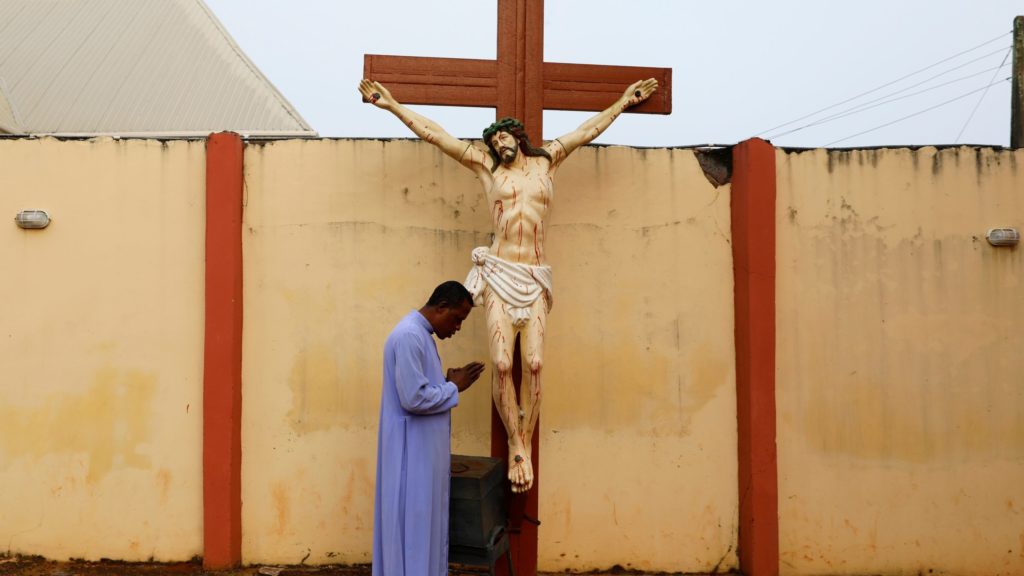As Nigerians are sounding alarms over what some describe as a mounting “genocide” against Christians in Africa’s most populous nation, some observers are also expressing disappointment that the U.S. State Department has failed to designate Nigeria a country of special concern for religious freedom violations.
Over the New year’s holidays, reports from Nigeria suggest that largely Muslim Fulani herdsmen launched a series of assaults on Christian targets in Plateau State, leaving at least 300 people dead.
Those assaults have continued into the New Year. On January 4, Boko Haram insurgents killed a pastor and at least 13 members of his Church, according to local news site “Sahara Reporters.” Pastor Ayuba was the leader of a Church of Christ in Nations congregation.
A further 50 Christian lives have been lost in attacks by Boko Haram and Fulani herdsmen in Borno and Kaduna States, according to Release International partners.
In his New Year’s message, the Governor of Plateau State, Caleb Manasseh Mutfwang, compared what’s going on to the Rwanda genocide of 1994.
“For the avoidance of doubt, it is a misrepresentation of facts to describe these needless and unprovoked attacks on our people as a Farmer-Herder clash as has always been the traditional narrative. Let us call a spade a spade, this is simple genocide,” Mutfwang said.
On Jan. 9, governors in Nigeria’s six North-Central states paid a condolence visit to Mutfwang, during which they too spoke of a genocide.
The Chairman of the North Central Governors Forum and Governor of Nasarawa State, Abdullahi Sule, said during the visit: “We have seen a similar situation in Rwanda, [so] I won’t call what is happening in the Plateau farmer-herder crisis. It’s not.”
“We have seen what happened in Rwanda and luckily, all four of us governors were there and we listened to the President of Rwanda when he told us about the courage that he took to actually invite everybody that is involved and look at the root causes,” Sule said.
At least 52,000 Christians have been killed in Nigeria since 2009, according to the International Society for Human Rights and the Rule of Law (“Intersociety”), an international monitoring group tracking genocide in Nigeria.
Last year, Fulani herdsmen were responsible for the deaths of at least 3,500 Christians, the group said.
The director of the Christian-inspired human rights organization said the genocide of Christians in Nigeria is being carried out with the complicity of the government.
“The government of Tinubu is part of the butchering machinery,” Emeka Umeagbalasi told Crux, referring to Nigerian President Bola Tinubu, who took office in late March.
“The Fulani jihadist rose to power under the Buhari administration and was able to take control of everything,” he said, asserting that Tinubu is set to perpetuate that heritage. The reference was the Nigeria’s previous government under former President Muhammadu Buhari.
“People like us are not expecting any shift in policy unless the government of Tinubu is compelled internationally,” Emeka said.
In terms of international pressure, it has frustrated some observers that the U.S. State Department has not flagged Nigeria as a “Country of Particular Concern” with regard to religious freedom violations.
In a statement, the independent U.S. Commission on International Religious Freedom objected that neither Nigeria nor India have been flagged by the State Department, calling the omissions “inexplicable.”
On Jan. 4, the State Department designated the People’s Republic of China, Cuba, the DPRK, Eritrea, Iran, Nicaragua, Pakistan, Russia, Saudi Arabia, Tajikistan, and Turkmenistan as Countries of Particular Concern (CRC) for having engaged in or tolerated particularly severe violations of religious freedom.
Emeka said that international pressure should be brought to bear on the Tinubu administration if Nigerian Christians must be set on the way to freedom.
“The destiny of Nigerian Christians lies in the hands of international state actors and non-state actors to pile enough pressure on the government of Nigeria and compel the government of Nigeria to do the needful,” Emeka told Crux.
He said one way of compelling the government to act is by tying foreign aid to religious freedom. Otherwise, he said, “the killings are going to continue and with catastrophic consequences, including the total Islamization of the Middle Belt.”
Despite the continued attacks, the Christian Association of Nigeria, an ecumenical body which includes the Catholic Bishops’ Conference of Nigeria, has urged calm.
“In the face of these adversities, it is imperative that we, as a people, refuse to be discouraged. Instead, we must come together and remain resolute in our commitment to build a united, peaceful, and prosperous nation,” said the president of the association, Archbishop Daniel Okoh, a member of the Christ Holy Church International.
“As we look to the year ahead, let us do so with a renewed sense of purpose and an unwavering commitment to fostering a better future for our beloved Nigeria. Let us draw strength from our faith, our shared values, and our collective resolve to surmount the obstacles that confront us,” Okoh said.

